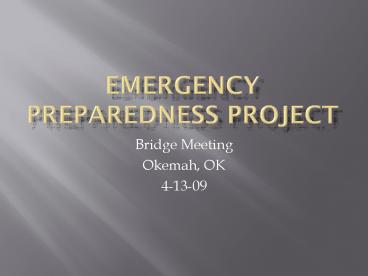Emergency Preparedness Project - PowerPoint PPT Presentation
1 / 20
Title:
Emergency Preparedness Project
Description:
Personnel from health department, EMS, city and county ... Some disagreement about which ones are currently involved (next section) Those who could help: ... – PowerPoint PPT presentation
Number of Views:38
Avg rating:3.0/5.0
Title: Emergency Preparedness Project
1
Emergency Preparedness Project
- Bridge Meeting
- Okemah, OK
- 4-13-09
2
Summary of Previous Meetings
- Meeting 1 Okemah Emergency Management Personnel
- 3/13/09
- Personnel from health department, EMS, city and
county emergency management, Creek Nation,
Creoks, churches - Meeting 2 Boley citizens
- 3/24/09
- Expressing their opinions on past emergencies and
sharing their experiences
Both groups answered same list of questions
3
Items Discussed
- Recent Experiences with Natural Disasters
- How well community responded / preparation level
- Least prepared for disasters
- Assistance available
- Existing Resources
- Local organizations involved in helping community
prepare - Other organizations who could be involved
- Assessing the EPD Project
- Are the steps reasonable / appropriate?
- Value of community coach
- Is the vulnerability assessment process useful?
4
Todays Agenda
- Session 1 Some Areas of Agreement
- Session 2 Some Areas of Differences
- Session 3 Opinions on the EPD Project
Responses / comments from first two meetings will
be shown, then break into discussion groups for
more in-depth conversation
5
Some Areas of Agreement
- Issues / topics that were consistent in both
meetings
6
What Type of Natural Disasters Did You Experience?
- Ice Storms (Winter 2009, 2008, 2007, 2005, 2001)
- Fires (Nov 2006, Spring 2007)
- Droughts / Fires
- Floods
- Tornadoes
7
What Type of Damage Did Your Community Suffer?
- Most Common
- Loss of electricity
- Fences / hay / livestock lost in fires
- Less Frequent
- Trees lost
- Paden gymnasium collapsed
- Street / road damage
- Weleetka businesses lost
8
Who in Your Community Was Least Able to
Prepare?Why?
- Elderly
- Lack of planning
- Lack of mobility
- Poor communication
- Those with small children
- Lack of mobility
9
Did You Get Information About the Natural
Disaster Ahead of Time?
- Mostly Yes
- But, sources of information used were varied
(next section) - Acknowledged strength of community
- Personal contacts
- Need for improved outside communication noted
10
What organizations could be valuable (but may not
have been involved up until now)?
- Some disagreement about which ones are currently
involved (next section) - Those who could help
- Ministerial alliance
- Local businesses
- Fire dept auxiliaries
11
Some Areas of Differences
- Issues / topics where there were inconsistencies
between groups
12
How Well Did Your Community Respond?
- Some thought the community responded quite well
- Well-trained combination of entire community
- People know their roles
- Some felt the community did not respond well
- Lack of a plan / lack of generators / equipment
- Some were very aware of Emergency Operations
Management (EOM) plans, others were not - Some knew immediately who to call / where to go,
for others the information was not obvious
13
How Well Did Your Plan Work?
- Some were very aware of Emergency Operations
Management (EOM) plans, others were not - Some saw the plan as a success for obtaining /
staging resources, others knew little about the
plan - Most agreed that educating the public about these
plans is problematic
14
Sources of Information
- Some indicated that most of their information
came from TV which had very little coverage for
their specific community - Weather radios were also used
- Others mentioned contact from the emergency
management team within Okfuskee county - Local contacts also seen as very important
15
What Local Organizations Were Involved in Helping
Your Community?
- Some saw very few local organizations that were
involved - Red Cross
- Fire Department
- Police
- Others saw a lot more
- Health Dept
- Department of Human Services
- Schools
- Hospitals
- State Govt
- Salvation Army
16
What are the Best Sources of Information for
Needs of At Risk People?
- Some listed large organizations
- DHS
- Health Department
- Schools
- Others listed local individuals or organizations
- Volunteer Fire Department
- Local leaders
- Church members
17
The EPD Project
- Feedback on the steps involved and the community
coach
18
Overall Assessment of EPD Project Process
- Most were fairly optimistic
- Felt it represented a good starting point
- Having an organized plan would help keep people
from panicking - Very inclusive
- Good to look at areas that are at risk
- Useful for future planning
- Involvement of new people is useful, but
challenging - Helps agencies who think about what if to be
better prepared - Will encourage participation from larger
community groups
19
Overall Assessment of EPD Project Process
- But some had a few problems with it
- Getting community involvement will be difficult
- Having enough volunteers to develop and implement
the plan would be challenging - Would require some technical expertise to
implement - Education needed before process even begins
(particularly for surrounding communities to
learn about each other) - How does it get updated?
- Need for person-to-person recruitment will be
time consuming
20
Thoughts on the Community Coach
- Most generally thought it was a good idea
- Must be someone from outside the community, with
experience - Would be necessary to have this person
- Good for motivation, and experience from other
sites - But there were a few problems noted
- Community coach cant do it all
- Difficult for the coach to relate to community
- Trust is an issue
- Cant have an overbearing personality
- How would they be funded?!





![Download Book [PDF] Unprepared: Global Health in a Time of Emergency PowerPoint PPT Presentation](https://s3.amazonaws.com/images.powershow.com/10050396.th0.jpg?_=20240607119)

























